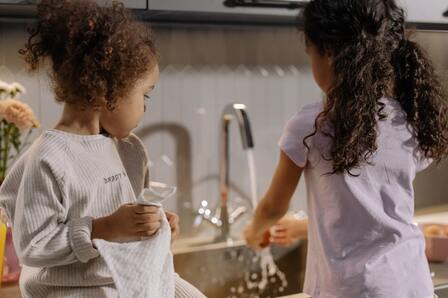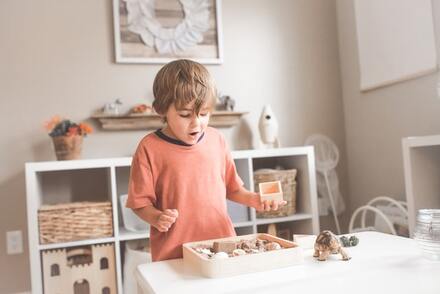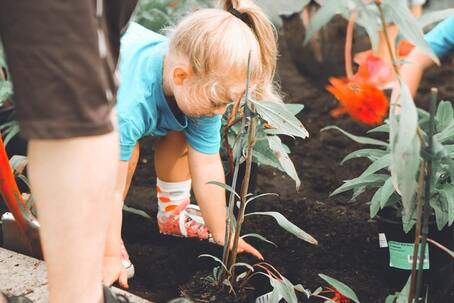You will be surprised how much your kids are capable of and how much they can contribute, even if they are just toddlers. However, keep in mind that every child is different and matures at a different pace. Therefore, you should consider various factors, not only age, when determining which chore is suitable for your kids.
Mistakes to avoid when it comes to chores
- Insisting on perfection - Try to have a relaxed approach to how your kids do chores. You can't expect perfect results from them, especially if they are young. Practice makes perfect, and your kids will become better in time; you just need to keep encouraging them and remain patient.
- Being inconsistent - It's imperative to stay consistent and not end up doing the chores instead of your kids. This will teach them to expect someone else to do chores for them.
- Waiting too long - Even if you think your kids are too young, you can never start teaching them too soon. They are more capable than you think, and introducing them to small tasks from a very young age can benefit them greatly.
- Being stingy with praise - Praise goes a long way. Even if you are not very happy with the outcome, you should still show appreciation for your kids' efforts.
- Presenting tasks in a negative way - Don't present chores as something boring that no one likes doing. If you present the chores as fun or even make a game out of them, they can even become indoor entertainment for your kids.
Guide to chores and responsibilities for kids
If you thought two or three-year-olds couldn't be helpful around the house, think again. You can easily teach them to perform simple tasks. Sure, they'll need your help at first, and you'll probably end up redoing the chores, but this is the best way for them to learn. Plus, it will ease any arguing that might happen when they are older.
- After they're done playing, they can put away their toys;
- Feed the family pet;
- Put away their dirty clothes;
- Help you make beds;
You want to teach your toddlers to be helpful and to do this, you have to set a positive example. They need to see you clean up after yourself or make your bed each morning as they learn by mimicking your behavior.
Preschoolers
The best thing about preschoolers is that they still desire to help their parents, and they can perform many tasks without supervision. As their coordination improves, they can follow more complex instructions, and they can also remember the task without you having to guide them every time.
- Get dressed on their own;
- Basic hygiene (washing hands or brushing teeth);
- Make their bed unsupervised;
- Assist with setting the table;
Your preschoolers can be helpful in various situations. For example, let's say you're moving. Moving with kids is difficult, but it can even be fun if you prepare and organize it well. The best way to achieve this is to involve your kids in the process. It might surprise you, but they will gladly participate as that will make them feel appreciated, and with your encouragement, they'll feel proud.
Primary schoolers
When your kids reach this age, they can handle a lot more responsibilities. However, primary schoolers learn independence and can go through a rebelling phase and show unwillingness to do chores. If that is the case, you must arm yourself with patience and be firm. They need to know that chores are something they can't avoid or decline.
Here are chores and responsibilities for kids in primary school:
- Get ready for school on their own, which includes picking out their outfit, brushing their teeth, combing their hair, etc.;
- Clean their own bedrooms;
- Help with putting away groceries and preparing dinner;
- Put away clean clothes in their dresser;
Kids this age need to learn the importance of chores. For example, you can set a day for cleaning their room on their own. Make sure you are consistent and that they understand why it needs to be done. This way, you'll even get a chance to peacefully work from home at least that one day.
Middle schoolers
Kids this age are old enough to take on responsibilities without you having to constantly remind them. You can even prepare a weekly or monthly list of chores for each family member. This way, you can hold your kids responsible if something is not done. It's important for kids to have commitments as they teach them self-reliance.
Here's what middle schoolers can help with:
- Load the dishwasher or wash the dishes;
- Prepare simple meals;
- Take the trash out;
- Babysit younger siblings or take care of family pet;
Middle schoolers can also get overwhelmed by independence, so it's essential to set a certain standard and stick to it.
High schoolers
High schoolers can do almost all tasks you can, and this is the perfect time to prepare them for college and living on their own. Even if your kids decide to live at home while in college, they can still help around the house and take some burden off your back.
- Go grocery shopping on their own and make more complex meals;
- Clean the bathroom and help with cleaning the kitchen;
- Mow the lawn and independently take care of your pet;
- Do laundry and iron clothes.
In conclusion
David B. Younger, Ph.D. is the creator of Love After Kids, for couples that have grown apart since having children. He is a clinical psychologist and couples therapist with a web-based private practice and lives in Austin, Texas with his wife, 16-year-old son, 7-year-old daughter and 9-year-old toy poodle.






 RSS Feed
RSS Feed